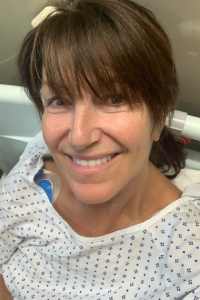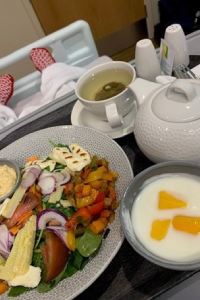A heartfelt recovery | Maria's cardiac ablation journey with Nuffield Health
- Overview
The diagnosis

“I go to spin classes three or four times a week, I've played golf and have always been an active person.”
Around 13 years ago, Maria was diagnosed with a leaky heart valve following a hysterectomy. This meant that as Maria’s heart pumped blood around, some blood was leaking backwards.
“It's never really affected me, only occasionally I used to get palpitations.”
“However, a while back, I started to get stronger palpitations and I thought that this isn't right. I was checking my Apple Watch and one minute my heart rate was at 60 and then the next minute it was 120. I went to my GP and they did an ECG, it was then confirmed I had atrial fibrillation.”
Wondering what will happen next, Maria was left in complete panic with an upcoming family holiday just around the corner.
“It was a week before I was due to travel. I was going with my parents and my only concern was letting them down.
“Rather than waiting for an NHS appointment, I contacted a cardiologist whom I had previously seen regarding my leaky heart valve. He said there were two options for me – an ablation, or a cardioversion to rectify it.”
Maria was referred to see Consultant Cardiologist, Dr Vinit Sawhney, at Nuffield Health The Holly Hospital.
“I was given the all clear to go away on holiday and was provided a blood thinning medication. That reassured me that I was able to go away. I shared my diagnosis with my parents as we returned home, as they would have worried the whole time.”
Maria’s Consultant Cardiologist, Dr Vinit Sawhney, at Nuffield Health The Holly Hospital and Nuffield Health at St Bartholomew's Hospital explains what an atrial fibrillation is:
“Atrial fibrillation (AF) is the commonest heart rhythm disturbance effecting over one million people in the UK. It can effect adults of any age but is more common as people get older. It is not a life threatening heart rhythm issue but can be troublesome and often requires treatment.”
The procedure
“I was really upset at the time as my dad went through similar heart conditions. He’s now 77 and struggles to walk long distances without getting breathless. I just envisaged myself in that situation and I totally panicked. But I was reassured that it could be fixed.”
Maria was booked into have her procedure at Nuffield Health at St Bartholomew’s Hospital just three weeks after her initial consultation with Dr Sawhney.
“She explained in detail what the ablation would entail and even drew a diagram. My husband and I came out of that appointment feeling so confident in her. I was amazed by the diagram and the way she explained everything in detail. She made me feel at ease and I didn't have any worries whatsoever about the procedure. I highly recommend Dr Vinit Sawhney, she was incredible.”
“Treatment of atrial fibrillation broadly involves prevention of blood clots (and hence stroke) and control of the irregular rhythm itself. The ablation procedure helps treat AF and is a definitive treatment to maintain a normal heart rhythm. It uses small burns or freezes to cause some scarring on the inside of the heart to help break up the electrical signals that cause the irregular heartbeats.
“One of the top reasons of doing this procedure is to improve the quality of life. The procedure does not put any restrictions on the patient and they are able to lead a healthy and active lifestyle,” says Dr Sawhney.
“I can say the stay in hospital was a great experience. Every step of the way I was treated very well. Walking into the operating theatre, which was just a few steps away from my room, I was completely calm and at ease. Even when I laid on that table, I was just so calm.”

Maria was visited by her consultant shortly after surgery and was assured the procedure had all gone well. She stayed in hospital for one night following her surgery.
“At regular intervals, the nurse came in to check on me. My blood pressure did drop so I was encouraged to sit up and drink water and then after that it returned to normal.
“The whole experience was 10 out of 10. I was comfortable and the food was excellent. They suggested if I wasn’t hungry to just eat some fruit and some yogurt. They even made me a little packed lunch to take home at lunchtime.”
Returning home
“After surgery, I was reassured that my heart will be fine, but I should be cautious of my leg. It was made very clear to me that if any sort of lumps appear then to get in touch, as it could be a sign of a blood clot.
“Over the weekend, I was concerned as I started feeling some spasms in my leg. I emailed the photo of my leg to the nursing staff and shortly after they came back to me. They reassured me that if there were no lumps, it was normal. The nursing staff also rang to check up on me a few days later.
“I didn't realise how unwell I was until after the operation.”
Cardiac rehabilitation
Two months post-surgery, Maria has been able to reduce her medication. She has also been enrolled in our 8-week Cardiac Rehabilitation programme at the Barbican Nuffield Health Fitness and Wellbeing Centre.
This is a comprehensive multi-disciplinary eight-week rehabilitation in support of recovery from a cardiac procedure.
“I was recommended to take part in the cardiac rehabilitation programme. There's a group of us that do the workout and there's also some educational sessions.
“The advice I have been given is just to live a normal life and that's what I've been doing. I'm back to exercising and that was one of the good things about the cardiac rehabilitation programme.
“During the first session, my heart rate was being checked when I was on the treadmill and doing some exercises. That reassured me and gave me confidence being back in the gym again.”
Find out more about the Nuffield Health cardiac rehabilitation programme
- Family man Jonathan recovers from an unexpected heart attack through cardiac rehab at Nuffield Health
- View our heart health services at Nuffield Health St Bartholomew’s Hospital
- Why cardiac rehabilitation is worth the investment
Last updated Wednesday 14 February 2024
First published on Wednesday 17 January 2024
